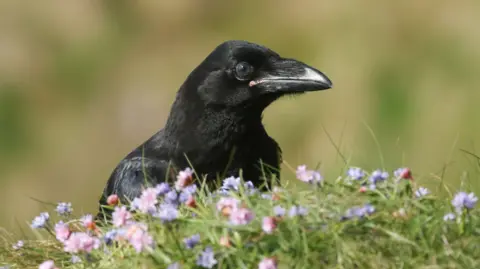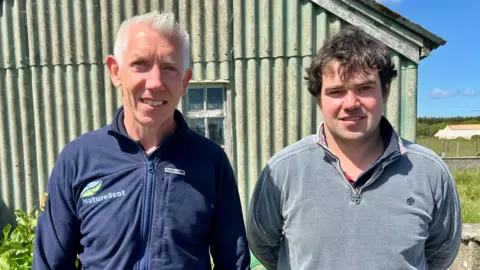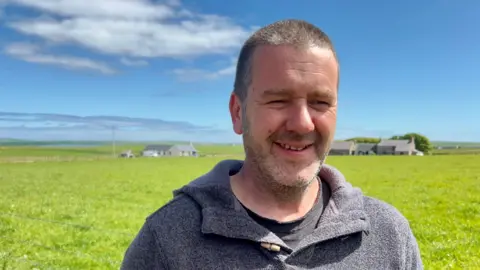New powers to shoot ravens after livestock attacks
 Getty Images
Getty ImagesNew powers to shoot young ravens in Orkney are being drawn up by Scotland's natural heritage agency following a spate of attacks on livestock.
Farmers say the birds have killed and injured lambs, sheep and calves, caused distress to both the animals and those caring for them, and significant financial losses.
In a meeting organised by farmers in the islands, NatureScot officials agreed current controls are not proving an effective deterrent.
NatureScot believes it will be possible to introduce an area licensing scheme for Orkney by this winter and will update farmers later this summer.
Licences to shoot ravens are currently granted by NatureScot only where there is no other satisfactory solution. Shooters target juvenile birds, because breeding pairs are not associated with livestock attacks.
Applicants have to demonstrate they have tried other scaring techniques and found them insufficient in reducing damage.
NatureScot presented evidence that 34 licences had been granted in Orkney since 2016 covering 28 locations. This resulted in 124 ravens being culled, 58% of the number which was permitted.
The farmers present said there was a lack of confidence in the current licensing regime, which includes restricting shooting permissions to specific fields.
This means birds can simply fly to safety in nearby land. NatureScot's Director of the Green Economy, Robbie Kernahan, admitted this was "bonkers".
He said new terms could be agreed that are more flexible. It is likely this will mean permission to shoot the birds over a wider area and for a longer period than currently permitted.

During the meeting on Monday, Mr Kernahan told farmers: "I don't think there's ever been any doubt ravens can and do have a significant impact on livestock.
"Where it becomes more interesting and challenging is what we do about that. It soon becomes clear there are not many alternatives to using lethal controls to scare them off."
Farmer Douglas Paterson has been one of Orkney's loudest voices demanding action to control raven numbers.
He said the birds have killed lambs and also sheep, which can be vulnerable and exposed when they roll onto their backs.
Other farmers told NatureScot officials that the birds have attacked the tongues and feet of young calves, leaving them with devastating injuries.
During the meeting a dead lamb was produced from a bag and placed in front of the officials as evidence of the problem.
Reacting to NatureScot's commitment to address Orkney's issue with ravens, Mr Paterson said: "I'm not 100% convinced it will happen, but if it does, I will be delighted.
"It just remains to be seen how well NatureScot will deliver this. We will not let them off with doing nothing."
Orkney is not the first place in Scotland, or the UK, to report problems with young ravens, which are the largest birds in the crow family in this country.
Greater controls on raven populations have previously been introduced in Skye and Argyll.
Mr Kernahan believes a more tailored approach in Orkney can now be justified.
He said: "I think enabling control measures at the right time of year is key.
"NatureScot will come up with licensing solutions enabling more flexibility so birds are taken a bit earlier across the islands where there are particular issues with attacks.
"We're committing to coming back by the end of the summer to explore that in more depth and have something in place by the back end of the year, in time for next winter."
'Serious damage to livestock'
NatureScot say they would be gathering more data on the need for greater control of raven numbers, but it would not let the need for further surveys be a barrier to action.
The Royal Society for the Protection of Birds (RSPB) also recognises the "serious agricultural damage to livestock" which ravens can cause at certain times of year.
A spokesperson for the RSPB said "While we are not responsible for licensing of lethal control, we have never objected to the use of specific licences to deal with ravens when substantiated and would support NatureScot's proposals to fund a local population survey."
However, Orkney wildlife expert Andy Mitchell said there was no significant increase in the number of raven nests, or the number of fledged young in the most recent surveys, though the last one was carried out in 2014.
Mr Mitchell said: "I have seen no compelling evidence of ravens killing healthy lambs. NatureScot cannot and must not ride roughshod over licensing rules to accommodate a few farmers."
'Clever birds'

Local shooter Robert Reid has experience of working within the current licensing regime on farms across Orkney.
He believes a more flexible scheme which covers a greater area stands a better chance of success.
"These birds are clever," he said. "They are very difficult to shoot. NatureScot told us about how far fewer birds are being taken than the current licenses permit.
"In the current time limit it's very difficult to get close to them.
"If we could shoot them throughout the year, we would be able to drop the number of young birds causing these problems and help the farmers save a few of their livestock."
During the meeting NatureScot committed to a holding a similar meeting in Shetland, after hearing farmers there are suffering similar issues with ravens attacking their livestock.
